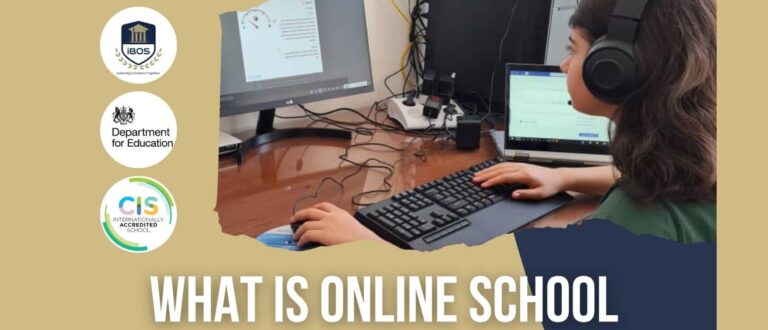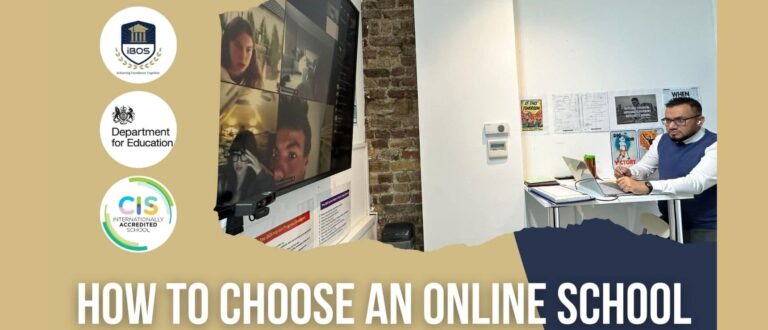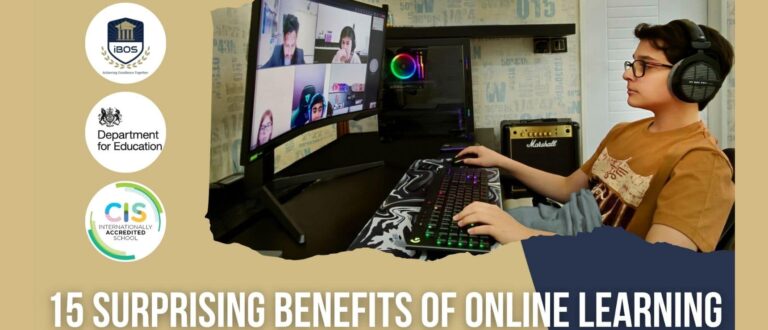Online schooling has many perks. It encourages teamwork and creativity, and removes barriers for socialising. This empowers children to make friends anywhere in the world, and is helpful for those that struggle to make friends in person.
Online learning is growing in popularity among young people. One in three internet users is under 18, and 46% of 16 – 24-year-olds have used online learning materials. 15% of people this age have also taken part in an online course.
Parents may be concerned that so much screen time is harmful to a learner’s development. But there are many benefits to online learning, including having more flexibility, participation in active learning, opportunities to socialise on- and off-screen, and fewer distractions.
Flexibility Gives More Time to Step Away From the Screen
Online schools teach lessons live and often record classes. Recordings are then uploaded to a central student platform where learners can view them at any time, giving students the flexibility to study at any time that suits them. If they don’t feel well enough to attend a live lesson, or if they have commitments outside of education, they can catch up with lesson recordings later.
Students with creative or sporting talents often need lots of time for practice and travel. With an online school, they can step away from the desk and keep up with their active schedules without compromising their learning. Actors, musicians and artists, plus the likes of cricketers and golfers, can take part in lessons from anywhere in the world. And brothers Luca, Zak and Freddy Carrick-Smith spend their mornings skiing on the slopes, and afternoons studying .
Here’s what online student, table tennis player and Commonwealth Games medallist Anna Hursey says about online learning:
I’m often abroad and would usually be unable to attend mainstream school. If I’m busy with table tennis, I can just go back and listen to the recorded lessons, so I don’t have to miss out on anything.”
It’s not just athletes who use online learning to fit more activity into their day. The flexibility allows you to spend more time in your favourite outdoor spot and enjoy more sunshine – something that’s difficult to do in winter when attending a traditional school.
Online Learning is Active, Not Passive
Multimedia learning is a big part of teaching programmes at some online schools. Students may regularly watch peer-reviewed videos, take part in interactive quizzes and listen to audio soundbites.
Many students who study STEM subjects get to apply their skills to real-world projects. This often includes termly assignments where learners work with each other. As part of their lessons, students may find themselves planning journeys, making meal plans and creating models.
When it comes to artistic subjects, children can still be hands-on through an online school. They can use the same materials as they would in a traditional school to paint, sculpt or take photos, enabling them to be creative. Then they share their work online and receive constructive feedback from students and teachers.
Collaborative learning isn’t restricted to the classroom. Many online schools have extra-curricular programmes such as theatre clubs, where learners work together to stage virtual plays. This includes rehearsing, recording and editing their performances for peers and parents to watch.
Technology such as virtual reality (VR), augmented reality (AR) and simulations can be more engaging than sitting at a desk. Plus students can get easy access to a wealth of digital resources.
Opportunities to Socialise, Online and Offline
Students often get to talk to each other in online schools’ virtual common rooms. Here, they can break into groups and discuss their shared interests. Older learners may also have the opportunity to communicate using a monitored social media platform. Since some online schools are global, this means they have opportunities to make friends around the world.
The best online schools also have a wide range of clubs and extra-curricular activities for learners to join, giving them plenty of opportunities to pursue new hobbies and make friends along the way. Whether they’re interested in chess, creative writing or debate, a good online school will have lots of options for children to consider.
Students get chances to meet in person as well. Online schools sometimes host summer camps, exchange programmes and international conventions. At events like these, learners can meet face-to-face with the peers they’ve met and befriended virtually, and join extra-curricular activities in their local areas.
Meet-ups aren’t just for learners. Their families can also get together in online and offline groups, to discuss shared interests and aspirations for their children.
Fewer, Not More, Distractions
It takes a lot of focus for children to get the grades they want. Traditional classrooms can be an obstacle to this, with distracting and misbehaving students wasting everyone’s time.
Learners are taken out of this scenario with an online school – you’ll find classes are free from distractions and interruptions to their learning, and students can study from the comfort of their own homes.
Even if children have days where they have to work on commitments outside of education, they can catch up with their classes later. Online schools usually keep recordings of their lessons that learners can access at any time.
What do students think of this approach? Here’s what actress and online learner Bella Ramsey says:
I get way more out of the lessons because there’s no frustrating distractions or loud unruly classes, you get to sit in the quiet and safety of your own home and learn … It also decreases peer pressure and the desire we all have to fit in to a certain box.
Bella Ramsey
Flexible Learning with King’s InterHigh
We know that there’s no ‘one-size-fits-all’ when it comes to learning. That’s why every individual King’s InterHigh student receives a flexible, high-quality education that revolves around their needs and lifestyle. Our expert teachers guide students to learn, grow, and thrive together, with a British and international education designed for online, from Primary to Sixth Form, for ages 7 to 19.







